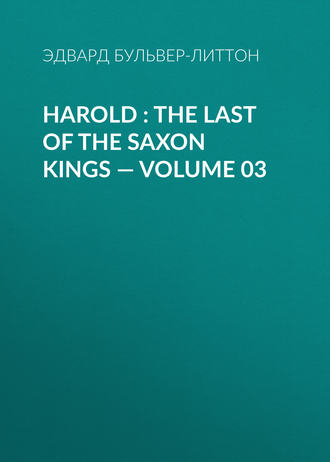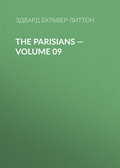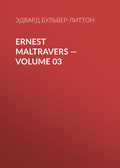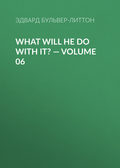
Эдвард Бульвер-Литтон
Harold : the Last of the Saxon Kings — Volume 03
Next to him stood the most dreaded and ruthless of the sons of Godwin —he, fated to become to the Saxon what Julian was to the Goth. With his arms folded on his breast stood Tostig; his face was beautiful as a Greek's, in all save the forehead, which was low and lowering. Sleek and trim were his bright chestnut locks; and his arms were damascened with silver, for he was one who loved the pomp and luxury of war.
Wolnoth, the mother's favourite, seemed yet in the first flower of youth, but he alone of all the sons had something irresolute and effeminate in his aspect and bearing; his form, though tall, had not yet come to its full height and strength; and, as if the weight of mail were unusual to him, he leant with both hands upon the wood of his long spear. Leofwine, who stood next to Wolnoth, contrasted him notably; his sunny locks wreathed carelessly over a white unclouded brow, and the silken hair on the upper lip quivered over arch lips, smiling, even in that serious hour.
At Godwin's right hand, but not immediately near him, stood the last of the group, Gurth and Harold. Gurth had passed his arm over the shoulder of his brother, and, not watching the nuncius while he spoke, watched only the effect his words produced on the face of Harold. For Gurth loved Harold as Jonathan loved David. And Harold was the only one of the group not armed; and had a veteran skilled in war been asked who of that group was born to lead armed men, he would have pointed to the man unarmed.
"So what says the King?" asked Earl Godwin.
"This; he refuses to restore thee and thy sons, or to hear thee, till thou hast disbanded thine army, dismissed thy ships, and consented to clear thyself and thy house before the Witanagemot."
A fierce laugh broke from Tostig; Sweyn's mournful brow grew darker;
Leofwine placed his right hand on his ateghar; Wolnoth rose erect;
Gurth kept his eyes on Harold, and Harold's face was unmoved.
"The King received thee in his council of war," said Godwin, thoughtfully, "and doubtless the Normans were there. Who were the Englishmen most of mark?"
"Siward of Northumbria, thy foe."
"My sons," said the Earl, turning to his children, and breathing loud as if a load were off his heart; "there will be no need of axe or armour to-day. Harold alone was wise," and he pointed to the linen tunic of the son thus cited.
"What mean you, Sir Father?" said Tostig, imperiously. "Think you to——"
"Peace, son, peace;" said Godwin, without asperity, but with conscious command. "Return, brave and dear friend," he said to Vebba, "find out Siward the Earl; tell him that I, Godwin, his foe in the old time, place honour and life in his hands, and what he counsels that will we do.—Go."
The Kent man nodded, and regained his boat. Then spoke Harold.
"Father, yonder are the forces of Edward; as yet without leaders, since the chiefs must still be in the halls of the King. Some fiery Norman amongst them may provoke an encounter; and this city of London is not won, as it behoves us to win it, if one drop of English blood dye the sword of one English man. Wherefore, with your leave, I will take boat, and land. And unless I have lost in my absence all right here in the hearts of our countrymen, at the first shout from our troops which proclaims that Harold, son of Godwin, is on the soil of our fathers, half yon array of spears and helms pass at once to our side."
"And if not, my vain brother?" said Tostig, gnawing his lip with envy.
"And if not, I will ride alone into the midst of them, and ask what Englishmen are there who will aim shaft or spear at this breast, never mailed against England!"
Godwin placed his hand on Harold's head, and the tears came to those close cold eyes.
"Thou knowest by nature what I have learned by art. Go, and prosper.
Be it as thou wilt."
"He takes thy post, Sweyn—thou art the elder," said Tostig, to the wild form by his side.
"There is guilt on my soul, and woe in my heart," answered Sweyn, moodily. "Shall Esau lose his birthright, and Cain retain it?" So saying, he withdrew, and, reclining against the stern of the vessel, leant his face upon the edge of his shield.
Harold watched him with deep compassion in his eyes, passed to his side with a quick step, pressed his hand, and whispered, "Peace to the past, O my brother!"
The boy Haco, who had noiselessly followed his father, lifted his sombre, serious looks to Harold as he thus spoke; and when Harold turned away, he said to Sweyn, timidly, "He, at least, is ever good to thee and to me."
"And thou, when I am no more, shalt cling to him as thy father, Haco," answered Sweyn, tenderly smoothing back the child's dark locks.
The boy shivered; and, bending his head, murmured to himself, "When thou art no more! No more? Has the Vala doomed him, too? Father and son, both?"
Meanwhile, Harold had entered the boat lowered from the sides of the aesca to receive him; and Gurth, looking appealingly to his father, and seeing no sign of dissent, sprang down after the young Earl, and seated himself by his side. Godwin followed the boat with musing eyes.
"Small need," said he, aloud, but to himself, "to believe in soothsayers, or to credit Hilda the saga, when she prophesied, ere we left our shores, that Harold—" He stopped short, for Tostig's wrathful exclamation broke on his reverie.
"Father, father! My blood surges in my ears, and boils in my heart, when I hear thee name the prophecies of Hilda in favour of thy darling. Dissension and strife in our house have they wrought already; and if the feuds between Harold and me have sown grey in thy locks, thank thyself when, flushed with vain soothsayings for thy favoured Harold, thou saidst, in the hour of our first childish broil, 'Strive not with Harold; for his brothers will be his men.'"
"Falsify the prediction," said Godwin, calmly; "wise men may always make their own future, and seize their own fates. Prudence, patience, labour, valour; these are the stars that rule the career of mortals."
Tostig made no answer; for the splash of oars was near, and two ships, containing the principal chiefs that had joined Godwin's cause, came alongside the Runic aesca to hear the result of the message sent to the King. Tostig sprang to the vessel's side, and exclaimed, "The King, girt by his false counsellors, will hear us not, and arms must decide between us."
"Hold, hold! malignant, unhappy boy!" cried Godwin, between his grinded teeth, as a shout of indignant, yet joyous ferocity broke from the crowded ships thus hailed. "The curse of all time be on him who draws the first native blood in sight of the altars and hearths of London! Hear me, thou with the vulture's blood-lust, and the peacock's vain joy in the gaudy plume! Hear me, Tostig, and tremble. If but by one word thou widen the breach between me and the King, outlaw thou enterest England, outlaw shalt thou depart—for earldom and broad lands; choose the bread of the stranger, and the weregeld of the wolf!"
The young Saxon, haughty as he was, quailed at his father's thrilling voice, bowed his head, and retreated sullenly. Godwin sprang on the deck of the nearest vessel, and all the passions that Tostig had aroused, he exerted his eloquence to appease.
In the midst of his arguments, there rose from the ranks on the strand, the shout of "Harold! Harold the Earl! Harold and Holy Crosse!" And Godwin, turning his eye to the King's ranks, saw them agitated, swayed, and moving; till suddenly, from the very heart of the hostile array, came, as by irresistible impulse, the cry, "Harold, our Harold! All hail, the good Earl!"
While this chanced without,—within the palace, Edward had quitted the presence-chamber, and was closeted with Stigand, the bishop. This prelate had the more influence with Edward, inasmuch as though Saxon, he was held to be no enemy to the Normans, and had, indeed, on a former occasion, been deposed from his bishopric on the charge of too great an attachment to the Norman queen-mother Emma15. Never in his whole life had Edward been so stubborn as on this occasion. For here, more than his realm was concerned, he was threatened in the peace of his household, and the comfort of his tepid friendships. With the recall of his powerful father-in-law, he foresaw the necessary reintrusion of his wife upon the charm of his chaste solitude. His favourite Normans would be banished, he should be surrounded with faces he abhorred. All the representations of Stigand fell upon a stern and unyielding spirit, when Siward entered the King's closet.
"Sir, my King," said the great son of Beorn, "I yielded to your kingly will in the council, that, before we listened to Godwin, he should disband his men, and submit to the judgment of the Witan. The Earl hath sent to me to say, that he will put honour and life in my keeping, and abide by my counsel. And I have answered as became the man who will never snare a foe, or betray a trust."
"How hast thou answered?" asked the King.
"That he abide by the laws of England; as Dane and Saxon agreed to abide in the days of Canute; that he and his sons shall make no claim for land or lordship, but submit all to the Witan."
"Good," said the King; "and the Witan will condemn him now, as it would have condemned when he shunned to meet it."
"And the Witan now," returned the Earl emphatically, "will be free, and fair, and just."
"And meanwhile, the troops——"
"Will wait on either side; and if reason fail, then the sword," said Siward.
"This I will not hear," exclaimed Edward; when the tramp of many feet thundered along the passage; the door was flung open, and several captains (Norman as well as Saxon) of the King's troops rushed in, wild, rude, and tumultuous.
"The troops desert! half the ranks have thrown down their arms at the very name of Harold!" exclaimed the Earl of Hereford. "Curses on the knaves!"
"And the lithsmen of London," cried a Saxon thegn, "are all on his side, and marching already through the gates."
"Pause yet," whispered Stigand; "and who shall say, this hour to- morrow, if Edward or Godwin reign on the throne of Alfred?"
His stern heart moved by the distress of his King, and not the less for the unwonted firmness which Edward displayed, Siward here approached, knelt, and took the King's hand.
"Siward can give no niddering counsel to his King; to save the blood of his subjects is never a king's disgrace. Yield thou to mercy, Godwin to the law!"
"Oh for the cowl and cell!" exclaimed the Prince, wringing his hands. "Oh Norman home, why did I leave thee?" He took the cross from his breast, contemplated it fixedly, prayed silently but with fervour, and his face again became tranquil.
"Go," he said, flinging himself on his seat in the exhaustion that follows passion, "go, Siward, go, Stigand, deal with things mundane as ye will."
The bishop, satisfied with this reluctant acquiescence, seized Siward by the arm and withdrew him from the closet. The captains remained a few moments behind, the Saxons silently gazing on the King, the Normans whispering each other, in great doubt and trouble, and darting looks of the bitterest scorn at their feeble benefactor. Then, as with one accord, these last rushed along the corridor, gained the hall where their countrymen yet assembled, and exclaimed, "A toute bride! Franc etrier!—All is lost but life!—God for the first man,—knife and cord for the last!"
Then, as the cry of fire, or as the first crash of an earthquake, dissolves all union, and reduces all emotion into one thought of self- saving, the whole conclave, crowding pell-mell on each other, bustled, jostled, clamoured to the door—happy he who could find horse, palfrey,—even monk's mule! This way, that way, fled those lordly Normans, those martial abbots, those mitred bishops—some singly, some in pairs; some by tens, and some by scores; but all prudently shunning association with those chiefs whom they had most courted the day before, and who, they now knew, would be the main mark for revenge; save only two, who yet, from that awe of the spiritual power which characterised the Norman, who was already half monk, half soldier (Crusader and Templar before Crusades were yet preached, or the Templars yet dreamed of),—even in that hour of selfish panic rallied round them the prowest chivalry of their countrymen, viz., the Bishop of London and the Archbishop of Canterbury. Both these dignitaries, armed cap-a-pie, and spear in hand, headed the flight; and good service that day, both as guide and champion, did Mallet de Graville. He led them in a circuit behind both armies, but being intercepted by a new body, coming from the pastures of Hertfordshire to the help of Godwin, he was compelled to take the bold and desperate resort of entering the city gates. These were wide open; whether to admit the Saxon Earls, or vomit forth their allies, the Londoners. Through these, up the narrow streets, riding three abreast, dashed the slaughtering fugitives; worthy in flight of their national renown, they trampled down every obstacle. Bodies of men drew up against them at every angle, with the Saxon cry of "Out—Out!" "Down with the outland men!" Through each, spear pierced, and sword clove, the way. Red with gore was the spear of the prelate of London; broken to the hilt was the sword militant in the terrible hand of the Archbishop of Canterbury. So on thy rode, so on they slaughtered—gained the Eastern Gate, and passed with but two of their number lost.
The fields once gained, for better precaution they separated. Some few, not quite ignorant of the Saxon tongue, doffed their mail, and crept through forest and fell towards the sea-shore; others retained steed and arms, but shunned equally the high roads. The two prelates were among the last; they gained, in safety, Ness, in Essex, threw themselves into an open, crazy, fishing-boat, committed themselves to the waves, and, half drowned and half famished, drifted over the Channel to the French shores. Of the rest of the courtly foreigners, some took refuge in the forts yet held by their countrymen; some lay concealed in creeks and caves till they could find or steal boats for their passage. And thus, in the year of our Lord 1052, occurred the notable dispersion and ignominious flight of the counts and vavasours of great William the Duke!
CHAPTER III
The Witana-gemot was assembled in the great hall of Westminster in all its imperial pomp.
It was on his throne that the King sate now—and it was the sword that was in his right hand. Some seated below, and some standing beside, the throne, were the officers of the Basileus16 of Britain. There were to be seen camararius and pincerna, chamberlain and cupbearer; disc thegn and hors thegn17; the thegn of the dishes, and the thegn of the stud; with many more, whose state offices may not impossibly have been borrowed from the ceremonial pomp of the Byzantine court; for Edgar, King of England, had in the old time styled himself the Heir of Constantine. Next to these sat the clerks of the chapel, with the King's confessor at their head. Officers were they of higher note than their name bespeaks, and wielders, in the trust of the Great Seal, of a power unknown of old, and now obnoxious to the Saxon. For tedious is the suit which lingers for the king's writ and the king's seal; and from those clerks shall arise hereafter a thing of torture and of might, which shall grind out the hearts of men, and be called CHANCERY!18
Below the scribes, a space was left on the floor, and farther down sat the chiefs of the Witan. Of these, first in order, both from their spiritual rank and their vast temporal possessions, sat the lords of the Church; the chairs of the prelates of London and Canterbury were void. But still goodly was the array of Saxon mitres, with the harsh, hungry, but intelligent face of Stigand,—Stigand the stout and the covetous; and the benign but firm features of Alred, true priest and true patriot, distinguished amidst all. Around each prelate, as stars round a sun, were his own special priestly retainers, selected from his diocese. Farther still down the hall are the great civil lords and viceking vassals of the "Lord-Paramount." Vacant the chair of the King of the Scots, for Siward hath not yet had his wish; Macbeth is in his fastnesses, or listening to the weird sisters in the wold; and Malcolm is a fugitive in the halls of the Northumbrian earl. Vacant the chair of the hero Gryffyth, son of Llewelyn, the dread of the marches, Prince of Gwyned, whose arms had subjugated all Cymry. But there are the lesser sub-kings of Wales, true to the immemorial schisms amongst themselves, which destroyed the realm of Ambrosius, and rendered vain the arm of Arthur. With their torques of gold, and wild eyes, and hair cut round ears and brow19, they stare on the scene.
On the same bench with these sub-kings, distinguished from them by height of stature, and calm collectedness of mien, no less than by their caps of maintenance and furred robes, are those props of strong thrones and terrors of weak—the earls to whom shires and counties fall, as hyde and carricate to the lesser thegns. But three of these were then present, and all three the foes of Godwin,—Siward, Earl of Northumbria; Leofric of Mercia (that Leofric whose wife Godiva yet lives in ballad and song); and Rolf, Earl of Hereford and Worcestershire, who, strong in his claim of "king's blood," left not the court with his Norman friends. And on the same benches, though a little apart, are the lesser earls, and that higher order of thegns, called king's thegns.
Not far from these sat the chosen citizens from the free burgh of London, already of great weight in the senate20,—sufficing often to turn its counsels; all friends were they of the English Earl and his house. In the same division of the hall were found the bulk and true popular part of the meeting—popular indeed—as representing not the people, but the things the people most prized-valour and wealth; the thegn landowners, called in the old deeds the "Ministers:" they sate with swords by their side, all of varying birth, fortune, and connection, whether with king, earl, or ceorl. For in the different districts of the old Heptarchy, the qualification varied; high in East Anglia, low in Wessex; so that what was wealth in the one shire was poverty in the other. There sate, half a yeoman, the Saxon thegn of Berkshire or Dorset, proud of his five hydes of land; there, half an ealderman, the Danish thegn of Norfolk or Ely, discontented with his forty; some were there in right of smaller offices under the crown; some traders, and sons of traders, for having crossed the high seas three times at their own risk; some could boast the blood of Offa and Egbert; and some traced but three generations back to neatherd and ploughman; and some were Saxons and some were Danes: and some from the western shires were by origin Britons, though little cognisant of their race. Farther down still, at the extreme end of the hall, crowding by the open doors, filling up the space without, were the ceorls themselves, a vast and not powerless body; in these high courts (distinct from the shire gemots, or local senates)—never called upon to vote or to speak or to act, or even to sign names to the doom, but only to shout "Yea, yea," when the proceres pronounced their sentence. Yet not powerless were they, but rather to the Witan what public opinion is to the Witan's successor, our modern parliament: they were opinion! And according to their numbers and their sentiments, easily known and boldly murmured, often and often must that august court of basileus and prelate, vassal-king and mighty earl, have shaped the council and adjudged the doom.
And the forms of the meeting had been duly said and done; and the King had spoken words no doubt wary and peaceful, gracious and exhortatory; but those words—for his voice that day was weak—travelled not beyond the small circle of his clerks and his officers; and a murmur buzzed through the hall, when Earl Godwin stood on the floor with his six sons at his back; and you might have heard the hum of the gnat that vexed the smooth cheek of Earl Rolf, or the click of the spider from the web on the vaulted roof, the moment before Earl Godwin spoke.
"If," said he, with the modest look and downcast eye of practised eloquence, "If I rejoice once more to breathe the air of England, in whose service, often perhaps with faulty deeds, but at all times with honest thoughts, I have, both in war and council, devoted so much of my life that little now remains—but (should you, my king, and you, prelates, proceres, and ministers so vouchsafe) to look round and select that spot of my native soil which shall receive my bones;—if I rejoice to stand once more in that assembly which has often listened to my voice when our common country was in peril, who here will blame that joy? Who among my foes, if foes now I have, will not respect the old man's gladness? Who amongst you, earls and thegns, would not grieve, if his duty bade him say to the grey-haired exile, 'In this English air you shall not breathe your last sigh—on this English soil you shall not find a grave!' Who amongst you would not grieve to say it?" (Suddenly he drew up his head and faced his audience.) "Who amongst you hath the courage and the heart to say it? Yes, I rejoice that I am at last in an assembly fit to judge my cause, and pronounce my innocence. For what offence was I outlawed? For what offence were I, and the six sons I have given to my land, to bear the wolf's penalty, and be chased and slain as the wild beasts? Hear me, and answer!"
"Eustace, Count of Boulogne, returning to his domains from a visit to our lord the King, entered the town of Dover in mail and on his war steed; his train did the same. Unknowing our laws and customs (for I desire to press light upon all old grievances, and will impute ill designs to none) these foreigners invade by force the private dwellings of citizens, and there select their quarters. Ye all know that this was the strongest violation of Saxon right; ye know that the meanest ceorl hath the proverb on his lip, 'Every man's house is his castle.' One of the townsmen acting on this belief,—which I have yet to learn was a false one,—expelled from his threshold a retainer of the French Earl's. The stranger drew his sword and wounded him; blows followed—the stranger fell by the arm he had provoked. The news arrives to Earl Eustace; he and his kinsmen spur to the spot; they murder the Englishman on his hearth-stone.—"
Here a groan, half-stifled and wrathful, broke from the ceorls at the end of the hall. Godwin held up his hand in rebuke of the interruption, and resumed.
"This deed done, the outlanders rode through the streets with their drawn swords; they. butchered those who came in their way; they trampled even children under their horses' feet. The burghers armed. I thank the Divine Father, who gave me for my countrymen those gallant burghers! They fought, as we English know how to fight; they slew some nineteen or score of these mailed intruders; they chased them from the town. Earl Eustace fled fast. Earl Eustace, we know, is a wise man: small rest took he, little bread broke he, till he pulled rein at the gate of Gloucester, where my lord the King then held court. He made his complaint. My lord the King, naturally hearing but one side, thought the burghers in the wrong; and, scandalised that such high persons of his own kith should be so aggrieved, he sent for me, in whose government the burgh of Dover is, and bade me chastise, by military execution, those who had attacked the foreign Count. I appeal to the great Earls whom I see before me—to you, illustrious Leofric; to you, renowned Siward—what value would ye set on your earldoms, if ye had not the heart and the power to see right done to the dwellers therein?"
"What was the course I proposed? Instead of martial execution, which would involve the whole burgh in one sentence, I submitted that the reeve and gerefas of the burgh should be cited to appear before the King, and account for the broil. My lord, though ever most clement and loving to his good people, either unhappily moved against me, or overswayed by the foreigners, was counselled to reject this mode of doing justice, which our laws, as settled under Edgar and Canute, enjoin. And because I would not,—and I say in the presence of all, because I, Godwin, son of Wolnoth, durst not, if I would, have entered the free burgh of Dover with mail on my back and the doomsman at my right hand, these outlanders induced my lord the King to summon me to attend in person (as for a sin of my own) the council of the Witan, convened at Gloucester, then filled with the foreigners, not, as I humbly opined, to do justice to me and my folk of Dover, but to secure to this Count of Boulogne a triumph over English liberties, and sanction his scorn for the value of English lives."







